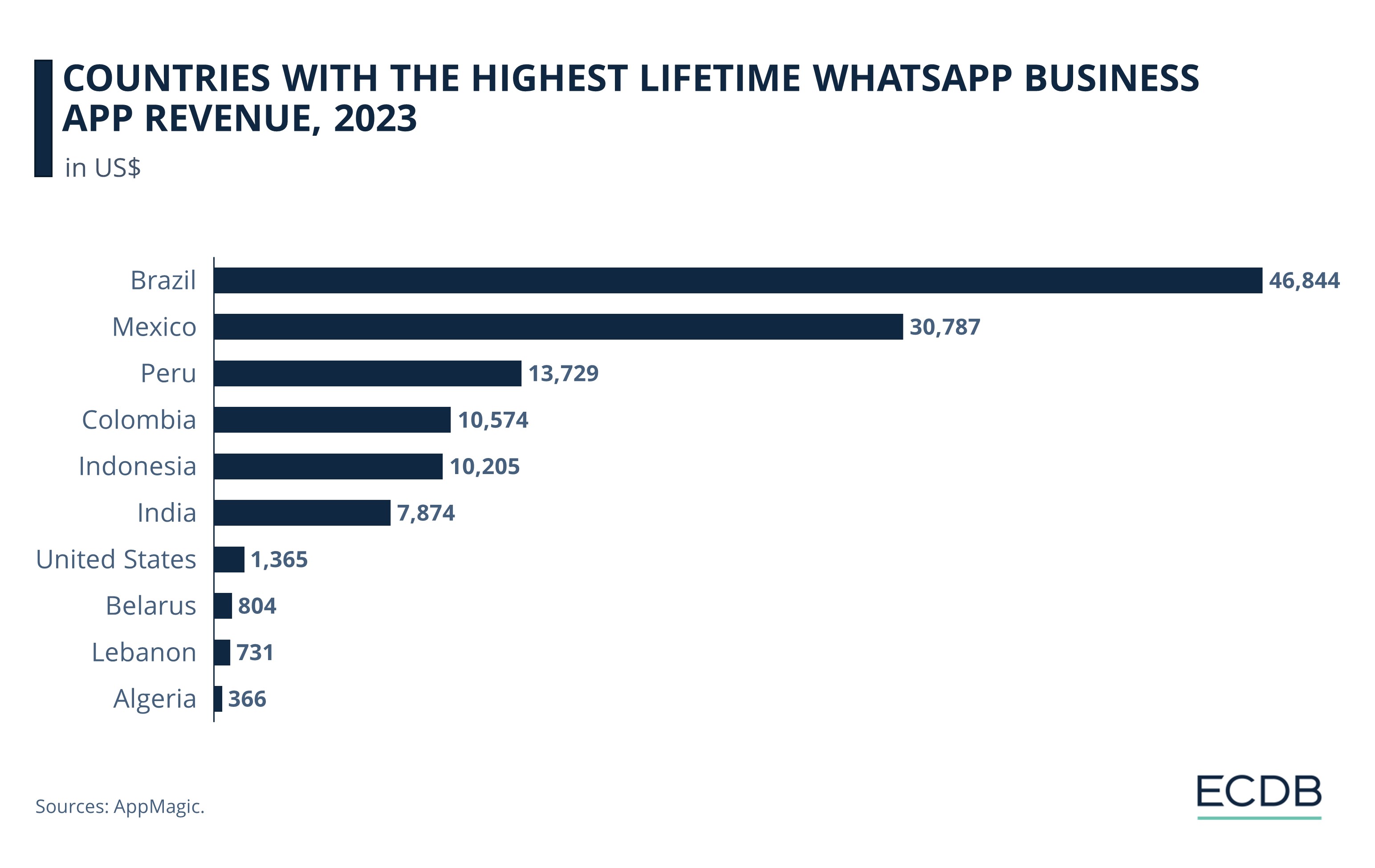ECOMMERCE: WHATSAPP
WhatsApp Business App & eCommerce: Global Online Revenues
Messaging platform meets eCommerce needs in Meta’s WhatsApp Business app. With its launch, companies found a way to instantly connect with their customers. Where is WhatsApp Business most downloaded in 2024? And in which countries does it generate its highest lifetime revenue?
Article by Lucia Laurer | July 01, 2024Download
Coming soon
Share

WhatsApp Business App & eCommerce: Key Insights
Most Downloads: As of 2024, WhatsApp Business draws the largest user base from India, with 481 million downloads on Android and iOS devices. It is followed by Indonesia (121 million) and Pakistan (111 million).
Highest Lifetime Revenues: Brazil leads with lifetime WhatsApp Business app revenue of US$46,844. In fact, four out of five countries with the highest lifetime revenues for this app are Latin American.
Brazil & WhatsApp Business: WhatsApp Business has become part of eCommerce in Brazil. With widespread adoption and helpful functions like payment integration, Brazil leads other countries in successfully using WhatsApp Business.
WhatsApp has an eCommerce-specific iteration: WhatsApp Business. Built “with the small business owner in mind”, per Meta, the app strives to be a convenient platform for sellers, with features tailored to their online business needs.
Since its launch in 2018, WhatsApp Business has garnered increasing success. From 50 million monthly active users (MAUs) in July 2020, the number quadrupled to 200 million MAUs by June 2023. In the same year, its global revenues reached US$382.6 million.
But the app’s popularity varies from region to region—so does its revenue generation. We explore the download and lifetime revenue statistics for WhatsApp Business in 2024 by country.
Why Do Retailers Use WhatsApp Business App?
There are many reasons why online retailers may find WhatsApp Business a helpful platform for connecting with their customers. Some of its features include:
Business profile: Sellers can create a business profile on the app, which may function as a virtual storefront. They can list information like their name, website, and a business description.
Automated messages: Sellers can set up automated messages, such as away messages and quick replies. Similar features are interactive messages like selecting-from-a-menu, calls-to-action, delivery notifications, and feedback surveys.
Catalog: Sellers can share their product catalog within the app, simplifying the process of browsing, inquiring about, and ordering products for their customers.
In-app Payment: Customers can use this function to pay for a purchase in the app, without going to a third-party platform. However, this service is only available in selected countries.
Analytics: Sellers can use analytics to measure their performance such as message delivery and open rates, numbers of ongoing conversations, average response times, and average resolution times.
Where is WhatsApp Business Downloaded the Most in 2024?
Although WhatsApp Business has a global base, some countries outdo others in terms of downloads.
The latest download statistics reveal that users from Asia and Latin America have most actively downloaded the app, as of February 2024.

India tops the list of countries with the highest number of WhatsApp Business app downloads, with 481.2 million downloads.
Indonesia stands second with 128.4 million downloads.
Pakistan is third, with 111 million downloads.
Brazil is fourth, with 98 million downloads.
Nigeria rounds off the top five, with 35 million downloads.
Ranking sixth to tenth are Egypt, Russia, Mexico, the United States, and Colombia, with between 31 and 21 million downloads.
The data shows that WhatsApp Business has limited popularity in the biggest eCommerce markets like the U.S. and China:
Although the U.S. is WhatsApp’s home country, it is outpaced by competing platforms like iMessenger, Facebook Messenger, and local mobile service providers that offer attractive flat rates for SMS. This likely restricts a turn to WhatsApp Business.
China does not rank on the list as there, homegrown apps like WeChat are commonly used for business messaging and payment purposes.
On the other hand, emerging markets like India, Indonesia, and Latin American countries present massive revenue opportunities for Meta through its WhatsApp Business app:
WhatsApp is the most popular e-messaging app in Indonesia, with a penetration rate of 91%. This familiarity facilitates the adoption of WhatsApp Business.
India is now the world’s most populous country. Half of its residents – over half a billion – are connected to the internet. Recognizing its potential for conversational commerce, Meta unrolled WhatsApp Pay in India last year, which permits transactions between businesses. This makes India only the third country, behind Brazil and Singapore, where this function is available.
What is Conversational Commerce?
Within eCommerce, conversational commerce refers to the use of instant communication technology to reach out to customers.
With this option, customers can get in touch with sellers without having to wait for their business hours. It also allows for personalization, faster feedback, and improved brand loyalty.
Messaging apps like WhatsApp Business, and other technologies like chatbots, voice assistants, and live chat are types of conversational commerce.
WhatsApp Business: Latin American Countries Generate Highest Lifetime Revenues
Lifetime revenue refers to the total amount of money an app user spends over the entirety of their relationship with the app.
This includes revenue from activities including in-app purchases, subscription, ads, and sales. App developers use this metric to predict the profitability of the app and forecast its growth.
WhatsApp Business has generated more than US$123,000 in lifetime revenues globally, as of October 2023.
Data shows that countries with the highest downloads for WhatsApp Business are not in the leading position when it comes to lifetime revenue numbers.

AppMagic identifies the countries where WhatsApp Business app has the highest lifetime revenues:
Brazil ranks first, with the highest lifetime WhatsApp Business revenue of US$46,844.
Mexico is second with a large margin, at US$30,787.
Peru is third. At US$13,729, it creates less than half of Mexico’s value.
Colombia stands fourth, with US$10,574.
Indonesia is fifth, with comparable lifetime revenue of US$10,205.
While sixth-ranking India is not too far behind at US$7,847, the United States (US$1,365), at seventh position, has a much lower lifetime revenue.
Although factors like the market size, demand, and digital maturity are important, aspects like culture and business environment play an instrumental role in determining an app’s lifetime revenue in a country. In Latin America, WhatsApp business continues to be more used because of its cost-effectiveness and reliability compared to other available options.
The lower-ranking countries in the top ten include Belarus, Lebanon, and Algeria, with their WhatsApp Business lifetime revenue ranging from US$366-804.
Strategic Moves: Brazil's Role in WhatsApp's Business Expansion
If the figures above underscore one finding, it is the relevance of Latin America, especially Brazil, for WhatsApp Business app. Brazil's dominance is not a coincidence—rather, it is backed by strategic moves.
Meta's decision to test the WhatsApp payment feature in Brazil signifies the country's pivotal role. Back in 2019, WhatsApp Pay was initially launched in Brazil, aiming to rival the success of China’s WeChat. Since December 2022, WhatsApp Pay has re-entered the country, this time with a strong partnership with eCommerce platform Mercado Libre.
In 2023, the service was expanded to include in-app payments for purchases from small businesses. The move represents a strategic goal to tap into a new revenue stream, enhancing WhatsApp's significance in Meta's overall business strategy – and Brazil is a pioneer market.
WhatsApp Business App & eCommerce: Closing Thoughts
Once exclusively a messenger app, WhatsApp has expanded its horizons by integrating eCommerce capabilities in its business app. With its familiar user interface, WhatsApp Business has become a convenient tool for small businesses to maintain their online presence, particularly in emerging consumer markets.
However, while the app provides instant messaging, it lacks the human touch which buyers often desire when it comes to customer service. The effect is magnified with chatbots and automatic messages, which may leave clients dissatisfied if their inquiries are more complex.
Moreover, an important feature like WhatsApp Pay is not universally available yet, and some advanced functions are accessible at a cost. The app also restricts teamwork, with multiple device support on a single phone number restricted at present. Such aspects may make this app unsuitable for growing businesses.
Sources: United Nations; Finextra; Reuters

Click here for
more relevant insights from
our partner Mastercard.
Related insights
Deep Dive
American Apparel & Footwear Association (AAFA) Calls Out Social Commerce Platforms for Counterfeiting
American Apparel & Footwear Association (AAFA) Calls Out Social Commerce Platforms for Counterfeiting
Deep Dive
Shopify: The Globally Most Used Shop Software Is Growing High in Q2 2024
Shopify: The Globally Most Used Shop Software Is Growing High in Q2 2024
Deep Dive
Global Social Commerce Market: Top Platforms, Markets & Trends
Global Social Commerce Market: Top Platforms, Markets & Trends
Deep Dive
What Exactly Are In-Game or In-App Purchases?
What Exactly Are In-Game or In-App Purchases?
Deep Dive
AI in eCommerce: Better Deals, Greater Precision, and Easier Targeting
AI in eCommerce: Better Deals, Greater Precision, and Easier Targeting
Back to main topics